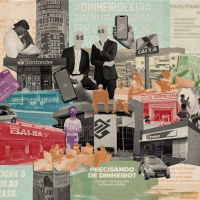Post-pandemic Poverty: Debt and the Feminisation of Finance in Marginal Sites
Debt is a recent driver of inequality in Latin America. This project explores the gendered implications of the new conditions of poverty, resulting from heightened credit dependency in the aftermath of the pandemic and facilitated by data driven financial technologies.
Illustration © Collage design by Luisa Caria og Matheus Tanajura. Photos by Marie Kolling and Thaíse Sá Santos.
Contact
Research and activites
Contact

Photo/illustration by Jette Mariboe, DIIS



